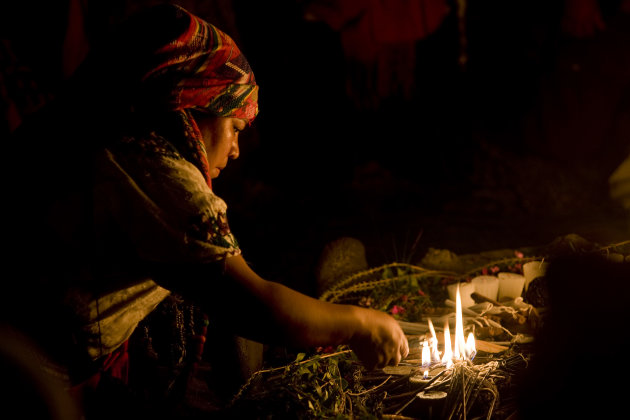I found this article on Yahoo News. Of course they claim the alleged Mayan prediction that the end of the age (baktun) means the end of the world is wrong, that the world will go on, and a new age begins. As I said in an earlier post this could well be, and probably be, another Y2K, where people panic and some make a ton of money on books, etc. and in the end nothing happens. But also consider, the Mayans that are being consulted today, are not the Mayans that created the calender, and understood the mathematics, astrology, and other techniques involved in what's become known to us. They have long ago, I'm sure taken to doing the rituals without understanding the reason. Also consider that thanks to the Spanish invaders and killers with their destruction of Mayan literature, we have only 4 known codices, or books, still existing. One of these called the Dresden Codice, is the one that we've gotten our understanding of the calender and what it means. If the murderous Spanish hadn't destroyed everything they got their hands on we might have a clearer understanding...or maybe not. Finally, it's not only the Mayan that predict the end of the age, among others so do the Hindu with the Kali Yuga, the Greeks with the Iron age, Christians have the book of Revelation (you'll find a post below that shows where we stand there), even the Buddhists although they believe the world will be restored so people can pursue enlightenment, which kind of suggests starting over in a new Golden Age. Depending who you read or talk to there have been four or five ages, meaning we are currently in the fourth or fifth now. Each age ended in destruction of the world, and a new world/age began. The Golden was the first and best, and supposedly the next, if in fact the end of the world and the age is upon us. But all of that aside, one reason for this article, perhaps the only reason, is that "our leaders" are worried, perhaps terrified, that the people will believe the end of the world is upon us and create problems, so they have their tame media publish articles and do programs that it's a false alarm, misunderstanding, etc. in the hope that the people will calm down and everything goes back to "normal."
Link to the Article
Experts: Mayas prophesized, but not end of World
By | Associated Press – 19 hrs ago
MEXICO CITY (AP) — As the clock winds down to Dec. 21, experts on the Mayan calendar have been racing to convince people that the Mayas didn't predict an apocalypse for the end of this year.
Some experts are now saying the Mayas may indeed have made prophecies, just not about the end of the world.
Archaeologists, anthropologists and other experts met Friday in the southern Mexico city of Merida to discuss the implications of the Mayan Long Count calendar, which is made up of 394-year periods called baktuns.
Experts estimate the system starts counting at 3114 B.C., and will have run through 13 baktuns, or 5,125 years, around Dec. 21. Experts say 13 was a significant number for the Mayans, and the end of that cycle would be a milestone — but not an end.Fears that the calendar does point to the end have circulated in recent years. People in that camp believe the Maya may have been privy to impending astronomical disasters that would coincide with 2012, ranging from explosive storms on the surface of the sun that could knock out power grids to a galactic alignment that could trigger a reversal in Earth's magnetic field.
Mexican government archaeologist Alfredo Barrera said Friday that the Mayas did prophesize, but perhaps about more humdrum events like droughts or disease outbreaks.
"The Mayas did make prophecies, but not in a fatalistic sense, but rather about events that, in their cyclical conception of history, could be repeated in the future," said Barrera, of the National Institute of Anthropology and History.Experts stressed that the ancient Mayas, whose "classic" culture of writing, astronomy and temple complexes flourished from A.D. 300 to 900, were extremely interested in future events, far beyond Dec. 21.
"There are many ancient Maya monuments that discuss events far into the future from now," wrote Geoffrey Braswell, an anthropologist at the University of California, San Diego. "The ancient Maya clearly believed things would happen far into the future from now."
"The king of Palenque, K'inich Hanaab Pakal, believed he would return to the Earth a couple of thousand years from now in the future," Braswell wrote in an email to The Associated Press. "Moreover, other monuments discuss events even before the creation in 3114 B.C."
Only a couple of references to the 2012 date equivalency have been found carved in stone at Mayan sites, and neither refers to an apocalypse, experts say.
Such apocalyptic visions have been common for more than 1,000 years in Western, Christian thinking, and are not native to Mayan thought.
"This is thinking that, in truth, has nothing to do with Mayan culture," said Alexander Voss, an anthropologist at the University Of Quintana Roo, a state on Mexico's Caribbean coast. "This thing about looking for end-times is not something that comes from Mayan culture."
Braswell compared the Mayan calendar, with its system of cycles within cycles, to the series of synchronized wheels contained in old, analogue car odometers.
"The Maya long count system is like a car odometer," Braswell wrote. "My first car (odometer) only had six wheels so it went up to 99,999.9 miles. That didn't mean the car would explode after reaching 100,000 miles."











No comments:
Post a Comment